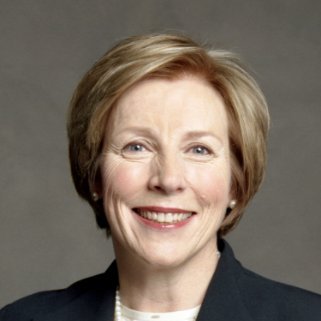Glencore, last all-male FTSE 100 board, appoints Patrice Merrin as director
Mining group recruits Canadian after years of pressure – most recently from Vince Cable – for failure to have woman on board
Glencore has appointed a female director after years of political pressure, ending its status as the last bastion of all-male boards in the FTSE 100.
The Guardian, Thursday 26 June 2014
Patrice Merrin, a Canadian former mining executive, has joined the mining and commodities trader as an independent non-executive director.

Patrice Merrin (Image from Linkedin)
Lord Davies, the former trade minister, set a target in 2011 for 25% female representation at FTSE 100 companies by next year. At the time, 21 of Britain’s top public companies had all-male boards but by March this year Glencore was the last.
Vince Cable, the business secretary, criticised Glencore last month for its persistent failure to appoint a female director. He said he would demand a meeting with the company’s chairman, former BP boss Tony Hayward after already discussing the subject with Glencore’s chief executive, Ivan Glasenberg.
At Glencore’s annual meeting a month ago, Hayward said the company wanted to appoint a female director by the end of this year. Cable said Glencore had three years to find a suitable woman to join the board.
Announcing Merrin’s arrival, Hayward said: “On behalf of the board I am delighted to announce the appointment of Patrice Merrin. Patrice’s in-depth experience of operating across the resources sector will help strengthen the board’s ability to work with the opportunities and challenges presented by the global extractive industry. Her record of non-executive director appointments, activist involvement and industry advisory board service is also an excellent complementary skill set to our board. “
Merrin, 64, worked at the mining group Sherritt for 10 years and rose to be chief operating officer before leaving in 2004. She then spent two years at Luscar, Canada’s biggest thermal coal producer, which she ran as chief executive for a year. She became a director of another Canadian miner, Stillwater, when an activist investor forced the company to revamp its board.
Davies made his recommendations after the financial crisis highlighted a lack of dissenting voices in boardrooms, which are made up largely of white, middle-class businessmen. Studies have shown that companies with female board members pay more attention to risk and are more financially successful.
Official Glencore press release
Biography
Patrice Merrin was elected to the board of Stillwater Mining Company on May 2, 2013. She was Chairman of the Board of Directors of CML HealthCare Inc., a leading provider of private laboratory testing services, until September 2013 as well as a member of the Nominating and Governance, Audit, and Human Resources Committees. Ms. Merrin joined the Board of CML HealthCare Inc. in March 2008 and became Chairman in March 2011. She also served as Interim President and Chief Executive Officer of CML HealthCare from May 2011 to February 2012. Since January 2012, she has served as a Director of Ornge, Ontario’s air ambulance service. She is also currently a Director of the Climate Change and Emissions Management Corporation, which was created in 2009 to support Alberta’s initiatives on climate change and the reduction of emissions.
From October 2009 to June 2011, Ms. Merrin served as a Director of Enssolutions Group Inc., which provides engineered environmental applications for mine tailings control, process dust and stockpile sealing. She also served as a Director of the NB Power Group, a company that generates and distributes electricity from nuclear, hydro, wind and oil, from 2007 to 2009 and as Chairman of the Environment, Health and Safety Committee from 2008 to 2009. From 2005 to 2006, Ms. Merrin served as President, Chief Executive Officer and a Director of Luscar Ltd., Canada’s largest producer of thermal coal, and as Executive Vice President from 2004 to 2005. Before joining Luscar, from 1999 to 2004, Ms. Merrin was Executive Vice President and Chief Operating Officer of Sherritt International Corporation, a diversified international natural resources company with assets in base metals mining and refining, thermal coal, oil, gas and power generation. In addition, Ms. Merrin was a member of the National Advisory Panel on Sustainable Energy Science & Technology from 2005 to 2006, and from 2003 to 2006 was a member of Canada’s National Round Table on the Environment and the Economy.
Ms. Merrin holds a Bachelor of Arts degree from Queen’s University and completed the Advanced Management Programme at INSEAD. She is a Director and former Chairman of the Council on Canadian American Relations, New York, NY.
Comment letter to the Ontario Securities Commission
October 4, 2013
Dear OSC Staff,
In response to the OSC’s call for comment (OSC Consultation Paper 58-401), I offer the following recommendations:
1. Introduce standards for length of board service, such as the UK’s 8 years and off. This will accelerate the opportunity to “renew” the boardroom mix of skills, expertise and behaviours. Without turnover, no new entrants need apply, however perfectly diverse and competent they may be. Without a higher rate of turnover, the pace and face of change cannot progress.
2. Introduce a target that women must comprise a minimum of 33% of a Board’s Directors by June 30, 2018, and state, at the outset, that if the targets are not met, quotas will be imposed.
I remind the OSC of Canada’s activities around International Women’s Year 1975 at which time, with the backing of Status of Women Minister Marc Lalonde, Bluma Appel carried the federal government’s official “Why Not?” campaign message—that we needed women on boards—to every large corporation in the land. Nigh on 40 years later, the Canadian Establishment of Peter Newman a distant memory, the percentage of women on public company boards is in the low teens. This is where “letting nature take its course” has gotten us.
My advice to the OSC is to “Just Do It.”
The views expressed herein are my personal views.
Yours sincerely,
Patrice E. Merrin
Corporate Director
